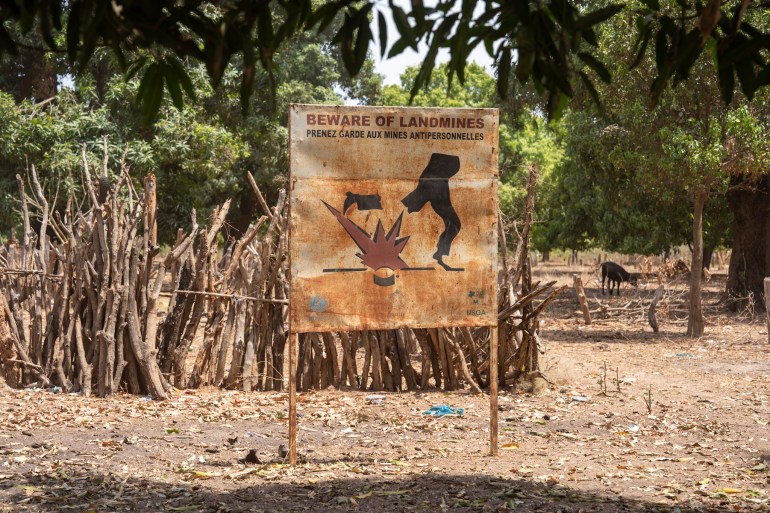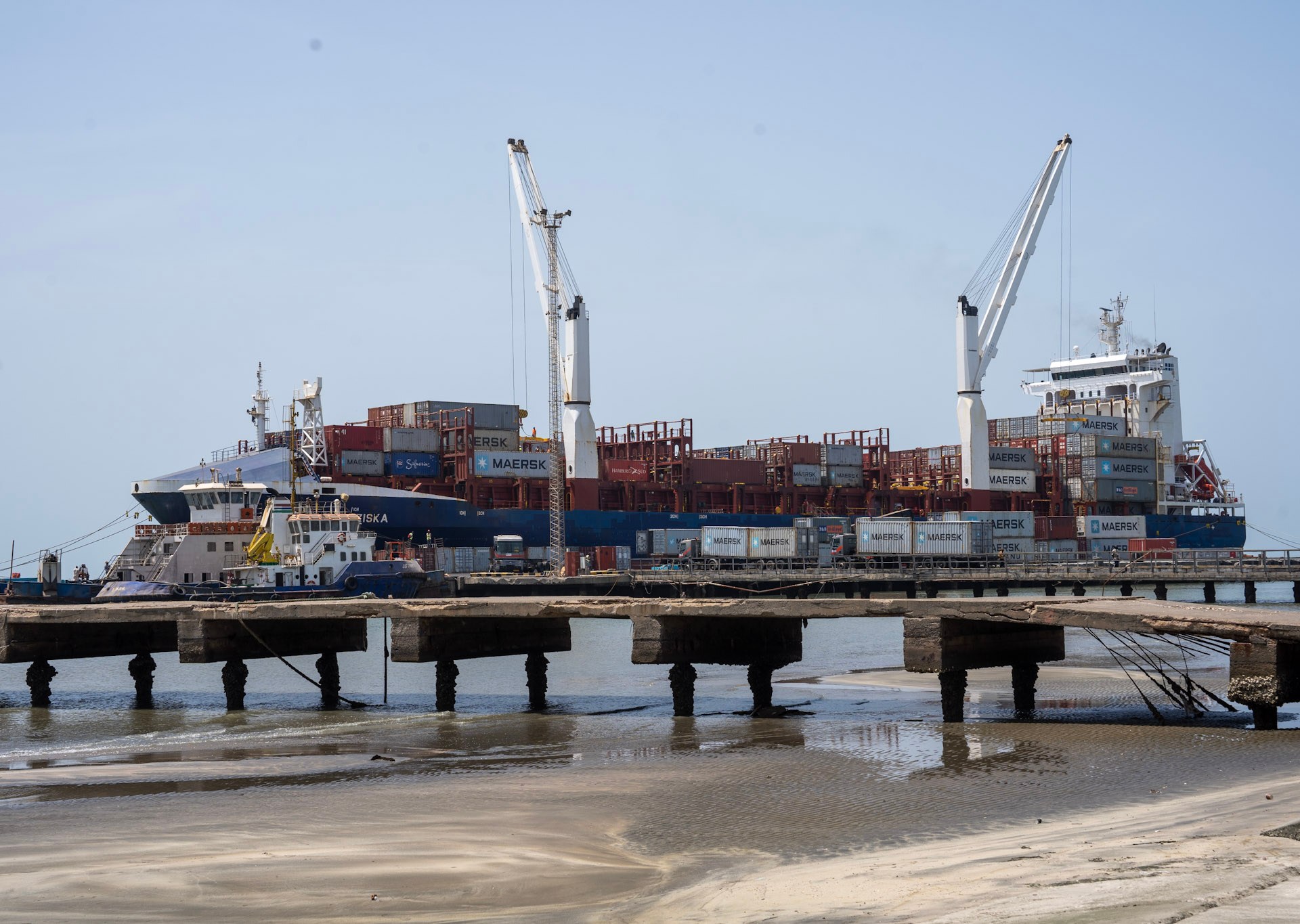‘Conflict tinder’: Gambian traffickers continue timber trade despite ban | Environment
Banjul, The Gambia — On a warm May day at a restaurant on the outskirts of Banjul, Lamin (last name withheld) outlined his plan to traffic rosewood timber from Senegal to The Gambia as he cleaned the meat off his chicken drumsticks.
“All of this has to be secret,” he whispered, trying to be reassuring about his almost decade-long experience in the illicit trade.
“Things have got more difficult recently, but it’s not impossible if you have the right contacts.”
For decades, timber has been smuggled by men like him from southern Senegal’s Casamance region into The Gambia to then be shipped to China. One of the most sought-after species is rosewood. Scientifically known as pterocarpus erinaceus, the crimson-coloured timber is in high demand by Chinese furniture manufacturers.
In 2012, the West African rosewood tree was officially classified as being on the brink of extinction in The Gambia. But the country, along with neighbouring Senegal and Guinea-Bissau, has continued to be among the primary suppliers of this species to China.
Since June 2022, there has been a regional ban on felling, transporting and exporting timber by the Convention on International Trade in Endangered Species of Wild Fauna and Flora (CITES). The Gambian government also instituted a ban that same year, but traffickers said they continue to work with Chinese businesspeople to smuggle the precious timber out of Casamance.
From 2017 to 2022 alone, China imported more than 3 million tonnes of rosewood worth at least $2bn from West Africa, according to the Environmental Investigation Agency (EIA), an international NGO.
Al Jazeera spoke to traffickers in The Gambia, posing as investors interested in getting involved in the timber trade. The traffickers revealed that the trade is still well under way and said 200 containers loaded with the timber sat in Banjul’s port, awaiting shipment to China. When reached for comment, the Gambian government said it was unaware of the presence of such containers.
Smugglers in Banjul showed Al Jazeera video footage of people loading rosewood logs onto a ship, saying it was a private vessel used exclusively for rosewood timber exports to China. According to Lamin, a container holds 80 to 90 logs, depending on their size. The older they are, the bigger the circumference and the more valuable they are. A full container can fetch more than $15,000. According to Lamin, traffickers like him can get up to $1,000 per container.
The process of exporting timber through Banjul’s port has become more difficult, according to the traffickers, who said obtaining export permits from authorities is no longer as easy as it was before. Private shipping lines, which used to be the main method of transport to China, stopped shipping timber in 2020.
“There is no way at the seaport yet,” admitted Secka, one of Lamin’s superiors, “but if you are getting into timber trafficking, you are supposed to have proper contacts in place.”
According to them, well-placed contacts within the port authority facilitate export procedures, which include permits and the deposit of containers, as do the police, who can greenlight the release of seized containers in exchange for what Lamin calls “tips”. Al Jazeera contacted the port authority and Gambian police but did not receive a response.
“You need to know people in the system, a backup in case you get caught,” Secka said, suggesting that authorities are heavily involved in the trafficking.
From Gambia to China
Accompanied by Lamin, Al Jazeera visited two depots in Banjul and its suburbs, both allegedly owned by Chinese businesspeople stacking the rosewood timber until they manage to export it to China.
One depot was filled with timber while another was empty. At the second location, several empty containers were stored, ready to be loaded with timber, while rosewood scraps lay scattered on the ground next to them.
“I need to operate far from the city. Here it’s quiet,” Lamin said.
Al Jazeera showed photos of the timber and the scraps found at the two locations to experts who said, “They very much look like pterocarpus erinaceus.” Satellite imagery also confirmed that logs have been stacked at the two locations over the past seven years. As the trafficker left one of the depots, a police officer jokingly inquired about the whereabouts of his timber.
When contacted about the findings, the Gambian Ministry of Environment, Climate Change and Natural Resources said it was unaware of containers with rosewood timber to be shipped to China.
A spokesperson added that “no permit to export rosewood has been issued to any institution of the government of The Gambia” and the ministry is not aware “of 1 cubic centimetre of rosewood entering the country”. The CITES Secretariat in Geneva declined to answer questions, citing “limited staff capacity”.
But an October 2023 report by the Washington, DC-based EIA confirms Al Jazeera’s findings. An analysis of trade data showed that the 2022 ban on rosewood trade has slowed it down but has not stopped it.
The report noted that the ban “appeared to trigger a rush for exports, in violation of the provisional suspension that had already been in force for three months prior to this notification”, pointing out that in July and August of that year, China imported more than 15,000 metric tonnes of rosewood from The Gambia.
Romain Taravella, an investigator with the EIA, was part of a team whose research on rosewood trafficking in The Gambia prompted CITES to adopt the regional ban — the strictest so far. The EIA investigation reported that from 2012 to 2020, 1.6 million trees were illegally harvested in Casamance and smuggled into The Gambia.
“[The Gambia has] never been a supporter of this regional ban nor a country that was acknowledging the need to have a ban,” Taravella told Al Jazeera. The EIA report also accused senior officials in the government of having been involved with trafficking during that time.
Prior to the ban, the EIA uncovered a well-organised system of misdeclaring timber in ports with traffickers falsely labelling the containers as peanuts or metal scraps. However, once the containers arrived in China, they were frequently declared as rosewood in import data.
Private shipping lines were the ones previously moving the timber to China. When the companies ceased such deliveries, Taravella noticed that the trade continued even after the ban came into effect, indicating the traffickers quickly adapted and found alternative routes.
“This means the system was very much well-oiled since before the ban,” Taravella said.
Rosewood import data from China from 2018 to 2023 obtained by Al Jazeera showed a 43 percent increase in rosewood imports from The Gambia in September last year, compared with the same month of the previous year and a 58 percent increase from pre-pandemic levels for the same month.
The CITES ban specifically prohibits the exportation and importation of rosewood timber, which essentially bans China from accepting rosewood imports. Al Jazeera reached out to the Chinese Ministry of Foreign Affairs for comment but got no response.
‘Conflict tinder’
Most of the trafficked rosewood comes from the lush, green Casamance region.
For the Indigenous peoples of Casamance, the region’s trees — particularly its rosewood — are considered sacred. Haidar el Ali, Senegal’s former environment minister and one of Africa’s best-known conservationists, lives in Casamance and has dedicated his retirement to preserving its forests.
“The traffic still happens towards The Gambia, but there’s less rosewood now than before,” Ali said, explaining that the rosewood stock in Casamance’s border areas with The Gambia has been dwindling.
For more than four decades, a low-intensity conflict between the Senegalese government and the Movement of Democratic Forces of Casamance (MFDC) has plagued the region, making it the longest-running conflict on the continent.
The MCDF rebels have been fighting the Senegalese army for independence. The region – which is culturally, linguistically, and ethnically distinct from the rest of Senegal – was added to the country’s territory after independence from France in 1960.
Border villages in The Gambia like Ballen are full of refugees who fled Casamance decades ago. Most of these villages are made up of Casamancese refugees and Gambian locals, only different by nationality but not by ethnicity or language.
In the Gambian village of Kayanga, Fatou Camara was sitting in her house one day in April last year around lunchtime when a bullet penetrated a wall and ricocheted into her bedroom as gunfire was heard in the distance.
“We’ve been living this nightmare for over 40 years,” Fatou said, adding that last year was “more intense” than the year before. She doesn’t know if the bullet belonged to the Senegalese army or the rebels.
Local reports have said the illegal timber trade is a principal source of income for the Casamance rebels, funding the rebellion and earning rosewood the name of “conflict tinder” by the EIA and Geneva-based TRIAL International.

Dubious arrangements
Despite its impact on continuing the rebellion and terrifying the border population, the trafficking of rosewood has long benefitted from dubious arrangements with people in high places.
Under the two-decade tenure of The Gambia’s former leader Yahya Jammeh, the illegal trade with China as well as trafficking from Casamance reached its peak. During his tenure, Jammeh allegedly exploited the country’s resources, evaded taxes and directly funded MFDC rebels through his company Westwood Gambia.
Westwood was the only timber company licensed for exports from 2014 to 2017, reportedly playing a major role in the illegal rosewood trade.
Jammeh was ousted from power in 2017. A year later, a special commission set up by the new administration conducted an investigation into his assets, which revealed that Westwood’s monopoly on timber exports to China generated more than $45m in revenue during its three years of operation.
The commission also uncovered that Jammeh looted at least $363m in public funds and illicit timber revenue, but the real amount is believed to be closer to $1bn. To this day, neither Westwood nor Jammeh and his partners have faced any criminal penalties in The Gambia. Jammeh escaped to Equatorial Guinea after losing the 2017 election and now lives there in self-imposed exile.
TRIAL International has lodged a case with the Swiss attorney general accusing Jammeh’s partner, Romanian-Swiss businessman Nicolae Buzaianu, of committing the war crime of pillage.
The charge covers his alleged role in funding the rebellion in Casamance and exploiting Senegal’s resources for personal gain. The Swiss attorney general’s office announced in 2022 that it had opened an investigation into Buzaianu’s dealings in The Gambia, even requesting legal assistance from the Gambian government.
But when Al Jazeera asked about the status of the investigation, the attorney general’s spokesperson said there are no current proceedings against a Swiss citizen in that context, not clarifying whether the official investigation is yet to begin or has been scrapped.
If the case were to proceed, it would mark a significant milestone in international law because there is no previous instance of a conviction for the war crime of pillage. In the meantime, Senegal’s endangered rosewood continues to be trafficked into The Gambia with the perpetrators escaping accountability.
“We are being robbed of our future in broad daylight, and we are watching it happen,” said Kemo Fatty, leader of the advocacy group Green Up Gambia.
Check out our Latest News and Follow us at Facebook
Original Source







